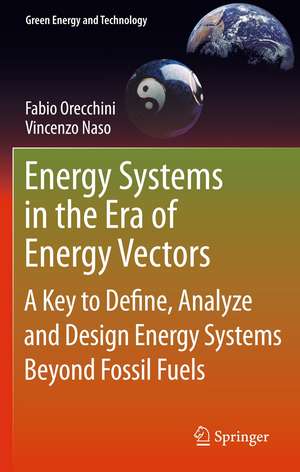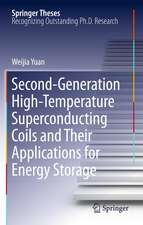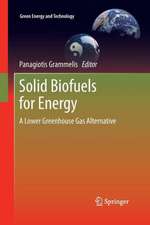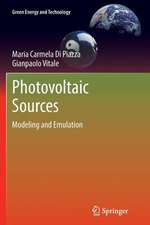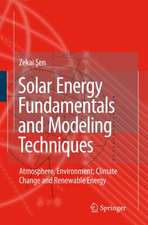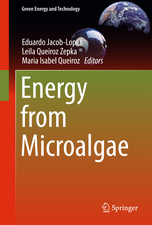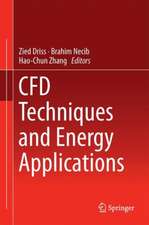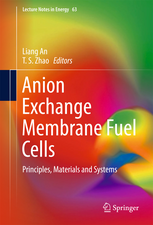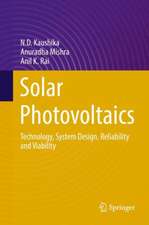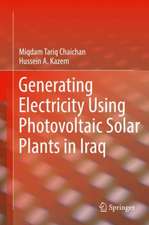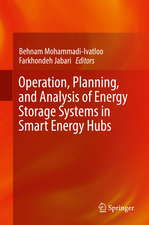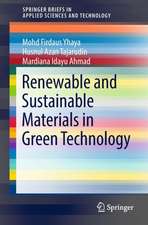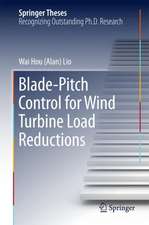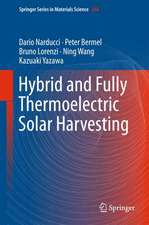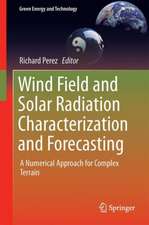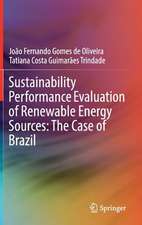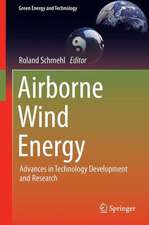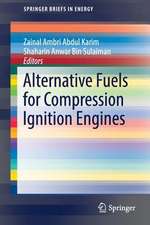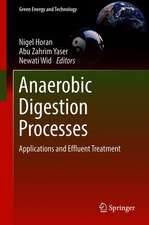Energy Systems in the Era of Energy Vectors: A Key to Define, Analyze and Design Energy Systems Beyond Fossil Fuels: Green Energy and Technology
Autor Fabio Orecchini, Vincenzo Nasoen Limba Engleză Paperback – 29 noi 2013
Instead of providing a traditional consumption analysis of classical primary energy resources such as oil, coal, nuclear power and gas, Energy Systems in the Era of Energy Vectors describes and assesses energy technologies, markets and future strategies, focusing on their capacity to produce, exchange, and use energy vectors. Special attention is given to the renewable energy resources available in different areas of the world and made exploitable by the integration of energy vectors in the global energy system.
Clear definitions of energy vectors and energy systems are used as the basis for a complete explanation and assessment of up-to-date, available technologies for energy resources, transport and storage systems, conversion and use. The energy vectors scheme allows the potential realization of a worldwide sustainable energy system to fulfill global development expectations by minimizing both the impact on the environment, and the international political frictions for access to limited and concentrated resources.
Energy Systems in the Era of Energy Vectors is an informative read for researchers and advanced students in industrial, energy and environmental engineering. It also contains valuable information for managers and technicians working in the energy sector.
| Toate formatele și edițiile | Preț | Express |
|---|---|---|
| Paperback (1) | 948.16 lei 6-8 săpt. | |
| SPRINGER LONDON – 29 noi 2013 | 948.16 lei 6-8 săpt. | |
| Hardback (1) | 952.89 lei 6-8 săpt. | |
| SPRINGER LONDON – 17 oct 2011 | 952.89 lei 6-8 săpt. |
Din seria Green Energy and Technology
- 18%
 Preț: 943.43 lei
Preț: 943.43 lei - 20%
 Preț: 629.52 lei
Preț: 629.52 lei - 18%
 Preț: 1124.92 lei
Preț: 1124.92 lei - 18%
 Preț: 947.35 lei
Preț: 947.35 lei - 15%
 Preț: 655.92 lei
Preț: 655.92 lei - 18%
 Preț: 957.62 lei
Preț: 957.62 lei - 18%
 Preț: 789.52 lei
Preț: 789.52 lei - 17%
 Preț: 464.55 lei
Preț: 464.55 lei - 15%
 Preț: 645.79 lei
Preț: 645.79 lei - 18%
 Preț: 903.93 lei
Preț: 903.93 lei - 24%
 Preț: 1322.07 lei
Preț: 1322.07 lei - 18%
 Preț: 890.54 lei
Preț: 890.54 lei - 18%
 Preț: 1115.46 lei
Preț: 1115.46 lei - 18%
 Preț: 1117.03 lei
Preț: 1117.03 lei - 18%
 Preț: 949.73 lei
Preț: 949.73 lei - 18%
 Preț: 892.11 lei
Preț: 892.11 lei - 15%
 Preț: 648.24 lei
Preț: 648.24 lei - 18%
 Preț: 997.09 lei
Preț: 997.09 lei - 15%
 Preț: 579.81 lei
Preț: 579.81 lei - 18%
 Preț: 1123.15 lei
Preț: 1123.15 lei - 18%
 Preț: 961.41 lei
Preț: 961.41 lei - 17%
 Preț: 490.22 lei
Preț: 490.22 lei - 18%
 Preț: 904.60 lei
Preț: 904.60 lei - 15%
 Preț: 643.34 lei
Preț: 643.34 lei -
 Preț: 287.90 lei
Preț: 287.90 lei - 24%
 Preț: 634.04 lei
Preț: 634.04 lei -
 Preț: 379.39 lei
Preț: 379.39 lei - 18%
 Preț: 783.20 lei
Preț: 783.20 lei - 18%
 Preț: 1394.84 lei
Preț: 1394.84 lei - 18%
 Preț: 1691.57 lei
Preț: 1691.57 lei - 18%
 Preț: 1112.48 lei
Preț: 1112.48 lei - 15%
 Preț: 592.61 lei
Preț: 592.61 lei - 18%
 Preț: 952.09 lei
Preț: 952.09 lei - 18%
 Preț: 944.19 lei
Preț: 944.19 lei - 18%
 Preț: 891.33 lei
Preț: 891.33 lei - 18%
 Preț: 1252.44 lei
Preț: 1252.44 lei - 18%
 Preț: 789.52 lei
Preț: 789.52 lei - 20%
 Preț: 566.29 lei
Preț: 566.29 lei - 18%
 Preț: 1113.71 lei
Preț: 1113.71 lei - 18%
 Preț: 1114.24 lei
Preț: 1114.24 lei - 24%
 Preț: 590.58 lei
Preț: 590.58 lei - 20%
 Preț: 567.49 lei
Preț: 567.49 lei - 24%
 Preț: 907.48 lei
Preț: 907.48 lei - 18%
 Preț: 952.89 lei
Preț: 952.89 lei - 18%
 Preț: 952.89 lei
Preț: 952.89 lei - 18%
 Preț: 950.52 lei
Preț: 950.52 lei
Preț: 948.16 lei
Preț vechi: 1156.29 lei
-18% Nou
Puncte Express: 1422
Preț estimativ în valută:
181.43€ • 189.94$ • 150.12£
181.43€ • 189.94$ • 150.12£
Carte tipărită la comandă
Livrare economică 05-19 aprilie
Preluare comenzi: 021 569.72.76
Specificații
ISBN-13: 9781447127130
ISBN-10: 1447127137
Pagini: 372
Ilustrații: VIII, 364 p.
Dimensiuni: 155 x 235 x 20 mm
Greutate: 0.52 kg
Ediția:2012
Editura: SPRINGER LONDON
Colecția Springer
Seria Green Energy and Technology
Locul publicării:London, United Kingdom
ISBN-10: 1447127137
Pagini: 372
Ilustrații: VIII, 364 p.
Dimensiuni: 155 x 235 x 20 mm
Greutate: 0.52 kg
Ediția:2012
Editura: SPRINGER LONDON
Colecția Springer
Seria Green Energy and Technology
Locul publicării:London, United Kingdom
Public țintă
ResearchCuprins
1. Energy Systems.- 2. Energy Resources.- 3. Energy Vectors.- 4. Energy Conversion and Transformation Plants.- 5. Distributed Generation and Cogeneration.- 6. Energy Useful Effect End Use.
Notă biografică
Fabio Orecchini is a professor of energy systems at Guglielmo Marconi University and Sapienza University of Rome, Italy. He is the founder and co-ordinator of GEA - Energy and Environment Group and GRA – Automotive Research Group at CIRPS - Interuniversity Research Centre for Sustainable Development, Sapienza University of Rome, Italy. He is also the Director of the Department of Energy and Mechanics of Guglielmo Marconi University and the scientific co-ordinator of national and international research consortiums in the field of sustainable energy systems for mobility and stationary uses.
Professor Orecchini is also Chairman of the international scientific committee of HySyDays, a world congress of young scientists working in the area of hydrogen energy systems, and founder and chairman of the scientific committee of H2Roma – energy&mobility show, an annual event held in Rome, Italy, with the largest automotive manufacturers and energy companies (BMW, Enel, Fiat, Ford, General Motors, Honda, Mercedes-Benz, Smart, Mitsubishi, Nissan, Porsche, PSA Peugeot Citroen, Toyota, Lexus, Volkswagen and Volvo), which has the ultimate aim of achieving "zero consumption, zero emission" cars and energy systems. He is the scientific responsible person of the “Innovation technologies” exhibition area within the Bologna Motor Show – Italian International Auto Show, held yearly in Bologna, Italy.
Together with Professor Vincenzo Naso, he has authored the book La società No Oil (No Oil Society), in Italian (2003, second edition 2006). He is also the author of original research and scientific papers in the fields of energy systems for sustainable development, high efficiency energy conversion systems, automotive and mobility engineering, renewable energies, and hydrogen energy technologies. He is a creator and promoter of the energy vectors approach for the design of energy systems, as discussed in this book.
Vincenzo Naso is aprofessor of energy conversion systems at the Department of Mechanical and Aerospace Engineering of the Sapienza University of Rome, Italy. He is the Director of CIRPS - Interuniversity Research Centre for Sustainable Development, Sapienza University of Rome, Italy, President of CIRPS Consortium, R&D and D Agency and past president of ISES Italia, Italian Branch of the International Solar Energy Society (ISES). He is also President of postgraduate Master's courses (EFER – energy efficiency and renewable energy sources, and MEA – energy and environmental management) at Sapienza University of Rome.
Professor Naso is the scientific co-ordinator of national and international research consortiums in the field of renewable energy and sustainable energy systems.
Together with Professor Fabio Orecchini, he has authored the book La società No Oil (No Oil Society), in Italian (2003, second edition 2006). He is also the author of original research and scientific papers in the fields of renewable energy, energy efficiency, Stirling engine, hydrogen energy technologies, and energy management. He is a creator and promoter of the energy efficiency approach for the design of energy systems that is explained and discussed in this book.
He is member of the International Committee of the Network of Networks of Universities implementing sustainability science, and Chairman of the 2010 International Conference on Sustainability Science (ICSS).
Professor Orecchini is also Chairman of the international scientific committee of HySyDays, a world congress of young scientists working in the area of hydrogen energy systems, and founder and chairman of the scientific committee of H2Roma – energy&mobility show, an annual event held in Rome, Italy, with the largest automotive manufacturers and energy companies (BMW, Enel, Fiat, Ford, General Motors, Honda, Mercedes-Benz, Smart, Mitsubishi, Nissan, Porsche, PSA Peugeot Citroen, Toyota, Lexus, Volkswagen and Volvo), which has the ultimate aim of achieving "zero consumption, zero emission" cars and energy systems. He is the scientific responsible person of the “Innovation technologies” exhibition area within the Bologna Motor Show – Italian International Auto Show, held yearly in Bologna, Italy.
Together with Professor Vincenzo Naso, he has authored the book La società No Oil (No Oil Society), in Italian (2003, second edition 2006). He is also the author of original research and scientific papers in the fields of energy systems for sustainable development, high efficiency energy conversion systems, automotive and mobility engineering, renewable energies, and hydrogen energy technologies. He is a creator and promoter of the energy vectors approach for the design of energy systems, as discussed in this book.
Vincenzo Naso is aprofessor of energy conversion systems at the Department of Mechanical and Aerospace Engineering of the Sapienza University of Rome, Italy. He is the Director of CIRPS - Interuniversity Research Centre for Sustainable Development, Sapienza University of Rome, Italy, President of CIRPS Consortium, R&D and D Agency and past president of ISES Italia, Italian Branch of the International Solar Energy Society (ISES). He is also President of postgraduate Master's courses (EFER – energy efficiency and renewable energy sources, and MEA – energy and environmental management) at Sapienza University of Rome.
Professor Naso is the scientific co-ordinator of national and international research consortiums in the field of renewable energy and sustainable energy systems.
Together with Professor Fabio Orecchini, he has authored the book La società No Oil (No Oil Society), in Italian (2003, second edition 2006). He is also the author of original research and scientific papers in the fields of renewable energy, energy efficiency, Stirling engine, hydrogen energy technologies, and energy management. He is a creator and promoter of the energy efficiency approach for the design of energy systems that is explained and discussed in this book.
He is member of the International Committee of the Network of Networks of Universities implementing sustainability science, and Chairman of the 2010 International Conference on Sustainability Science (ICSS).
Textul de pe ultima copertă
What lies beyond the era of fossil fuels? While most answers focus on different primary energy resources, Energy Systems in the Era of Energy Vectors provides a completely new approach.
Instead of providing a traditional consumption analysis of classical primary energy resources such as oil, coal, nuclear power and gas, Energy Systems in the Era of Energy Vectors describes and assesses energy technologies, markets and future strategies, focusing on their capacity to produce, exchange, and use energy vectors. Special attention is given to the renewable energy resources available in different areas of the world and made exploitable by the integration of energy vectors in the global energy system.
Clear definitions of energy vectors and energy systems are used as the basis for a complete explanation and assessment of up-to-date, available technologies for energy resources, transport and storage systems, conversion and use. The energy vectors scheme allows the potential realisation of a worldwide sustainable energy system to fulfil global development expectations by minimising both the impact on the environment, and the international political frictions for access to limited and concentrated resources.
Energy Systems in the Era of Energy Vectors is an informative read for researchers and advanced students in industrial, energy and environmental engineering. It also contains valuable information for managers and technicians working in the energy sector.
Instead of providing a traditional consumption analysis of classical primary energy resources such as oil, coal, nuclear power and gas, Energy Systems in the Era of Energy Vectors describes and assesses energy technologies, markets and future strategies, focusing on their capacity to produce, exchange, and use energy vectors. Special attention is given to the renewable energy resources available in different areas of the world and made exploitable by the integration of energy vectors in the global energy system.
Clear definitions of energy vectors and energy systems are used as the basis for a complete explanation and assessment of up-to-date, available technologies for energy resources, transport and storage systems, conversion and use. The energy vectors scheme allows the potential realisation of a worldwide sustainable energy system to fulfil global development expectations by minimising both the impact on the environment, and the international political frictions for access to limited and concentrated resources.
Energy Systems in the Era of Energy Vectors is an informative read for researchers and advanced students in industrial, energy and environmental engineering. It also contains valuable information for managers and technicians working in the energy sector.
Caracteristici
Proposes a completely new approach to the analysis of energy systems Assesses energy technologies, markets and strategies on their capacity to produce, exchange, and use energy vectors instead of limiting the analysis to the consumption of classical primary energy resources Written by experts in energy systems Includes supplementary material: sn.pub/extras
